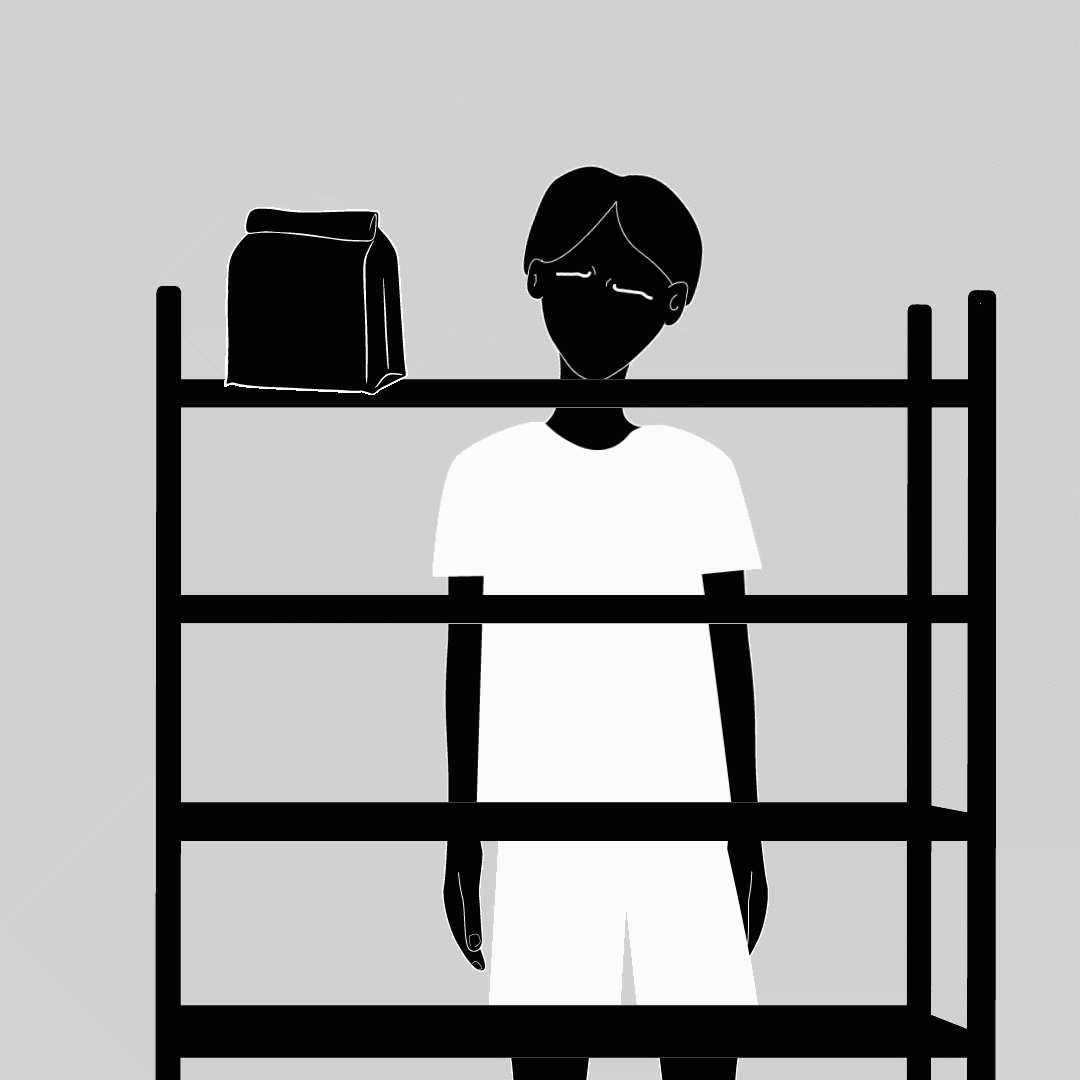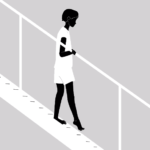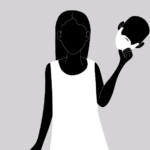PANIC THAT WOKE UP THE TRAUMA
What really piqued my curiosity, was the panic about flour. Although the institutions constantly said that we would not be left without flour, that there are enough reserves and that it is not necessary to buy more than we need, all this was not being taken into account by the citizens. Large purchases started before the first case in Kosovo, and their intensity increased even more after the first cases of taking measures to restrict movement
Illustration by: Argjira Kukaj

Ironically, my name is Elira (which means a free person) and I have been locked up at home for almost two months. Initially for caution I was showing about the situation created by the Coronavirus, and then from the measures taken by our state (and the whole world), I have been deprived of the right to move freely for so long.
It is understood that the measures taken were necessary to prevent the spread of COVID-19, however, it is also understandable that these measures affected the mental health of the entire population in different ways. And not everyone experiences the same way. For me, this is the first time I have encountered something like this. Free movement, food, health, I have taken everything for granted, ever since I can remember. Although I have often been informed from older people that we have not always enjoyed these rights in Kosovo. Apparently one does not think about them until this right is taken away from them. So, when the advices to staying at home started, I was thinking mainly about the fact that I would not be able to meet my friends for a while, that I wouldn’t be able to go out for coffee or go to college. And despite my preoccupations, which may seem ridiculous to someone, my parents, and many others like them, had other concerns in mind.
The wave of panic was invading the world. In China, new hospitals were being built from scratch out of fear that they would not be able to cope with the number of infected people in the hospitals they had; in the United States, panic was manifesting in the “war” for toilet paper; whereas in our country, the panic was manifested by the fear that we would be left without flour. Aside from China’s concern, the panic of the Americans ours was seeming somewhat unreasonable to me.
For the US, this seemed to have to do with the culture of using toilet paper a lot, although the panic to buy all the necessary products was evident, but the fights were surprisingly done for toilet paper! However, this issue requires another study…
What really piqued my curiosity, was the panic about flour. Although the institutions constantly said that we would not be left without flour, that there are enough reserves and that it is not necessary to buy more than we need, all this was not being taken into account by the citizens. Large purchases started before the first case in Kosovo, and their intensity increased even more after the first cases of taking measures to restrict movement. The biggest panic continued to be the lack of flour. The queues to buy flour were often “endless.” then in some cases the police had to intervene. There were even cases when the flour was smuggled, all this from creating unnecessary panic.
But why was all this panic happening, as if flour were the only product we could eat? Then, the institutions and the media constantly showed that there is no shortage of flour and that all this was unnecessary.
I was constantly asking myself that question, but I was also discussing it with many others. Young people were more likely to blame the media for the panic and the older ones (those who had actually created panic for potentially lack of flour) justified this panic by recalling the time of the war. Showing how during the war a family was fed with one kilogram of bread up to seven or more members and that family that had flour was considered lucky.
According to the American Psychiatric Association, which is an association dealing with mental health, there is a mental disorder known as Post-Traumatic Stress Disorder (PTSD), which may occur in people who have experienced or witnessed a traumatic event. Be it natural disaster, serious accident, terrorist act, war, rape or other violent personal attack. However, people with PTSD have disturbing thoughts and feelings about their experience that last even long after the traumatic event ends. They can relive the event through recollections or experiencing a similar event. These people can avoid situations or people who remind them of the traumatic event.
Consequently, people who experienced malnutrition, more precisely of flour, during the last war in Kosovo, began to feel post-traumatic stress by watching events unfold as a result of coronavirus. Thus, they began to buy flour as a result of the panic from the trauma they experienced in the past.
Thus, the world panic awakened the traumas of the last war among the Albanians, of post-traumatic stress aroused the panic of buying more flour than you needed. Meanwhile, for many others like me, who have not experienced such trauma, these purchases and this panic are completely unnecessary. As it turned out, now after almost four months since the beginning of social distancing and isolation, there is still enough flour and other food products, as well as their import and export continues to take place.
So one way or another, the whole panic about buying flour comes as stress from the trauma experienced 21 years ago. I am convinced that even if measurements are made through citizen surveys, the same result will be achieved by ages who have only experienced flour shortage during that period.
About the author: Elira Hasangjekaj, 21 years old, student at the Faculty of Journalism at the University of Prishtina.
This grant is supported by the ‘Civil Society programme for Albania and Kosovo’, financed by the Norwegian Ministry of Foreign Affairs and managed by Kosovar Civil Society Foundation (KCSF) in partnership with Partners Albania for Change and Development (PA). The content and recommendations do not represent the official position of the Norwegian Ministry of Foreign Affairs and Kosovar Civil Society Foundation (KCSF).


